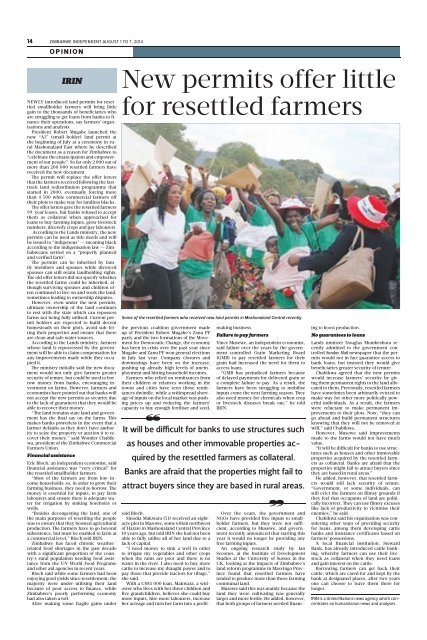You also want an ePaper? Increase the reach of your titles
YUMPU automatically turns print PDFs into web optimized ePapers that Google loves.
14<br />
ZImbabwe INdepeNdeNt aUgUst 1 to 7, 2014<br />
opinion<br />
IRIN<br />
NEWLY introduced land permits for resettled<br />
smallholder farmers will bring little<br />
gain to the thousands of beneficiaries who<br />
are struggling to get loans from banks to finance<br />
their operations, say farmers’ organisations<br />
and analysts.<br />
President Robert Mugabe launched the<br />
new “A1” (small-holder) land permit at<br />
the beginning of July at a ceremony in rural<br />
Mashonaland East where he described<br />
the document as a reason for Zimbabwe to<br />
“celebrate the emancipation and empowerment<br />
of our people”. So far only 2 000 out of<br />
more than 200 000 resettled farmers have<br />
received the new document.<br />
The permit will replace the offer letters<br />
that the farmers received following the fasttrack<br />
land redistribution programme that<br />
started in 2000, eventually forcing more<br />
than 4 500 white commercial farmers off<br />
their plots to make way for landless blacks.<br />
The offer letters gave the resettled farmers<br />
99-year leases, but banks refused to accept<br />
them as collateral when approached for<br />
loans to buy farming inputs, grow livestock<br />
numbers, diversify crops and pay labourers.<br />
According to the Lands ministry, the new<br />
permits can be used as title deeds and will<br />
be issued to “indigenous” — meaning black<br />
according to the indigenisation law — Zimbabweans<br />
settled on a “properly planned<br />
and verified farm”.<br />
The permits can be inherited by family<br />
members and spouses while divorced<br />
spouses can still retain landholding rights.<br />
The old offer letters did not specify whether<br />
the resettled farms could be inherited, although<br />
surviving spouses and children often<br />
continued to live on and work the land,<br />
sometimes leading to ownership disputes.<br />
However, even under the new permits,<br />
ultimate ownership of the land continues<br />
to rest with the state which can repossess<br />
farms not being fully utilised. Current permit<br />
holders are expected to build decent<br />
homesteads on their plots, avoid sub-letting<br />
their properties and ensure that there<br />
are clean and safe water sources.<br />
According to the Lands ministry, farmers<br />
whose land is repossessed by the government<br />
will be able to claim compensation for<br />
any improvements made while they occupied<br />
it.<br />
The ministry initially said the new document<br />
would not only give farmers greater<br />
security of tenure, but could be used to borrow<br />
money from banks, encouraging investment<br />
on farms. However, farmers and<br />
economists have pointed out that banks will<br />
not accept the new permits as security due<br />
to the lack of guarantees that they would be<br />
able to recover their money.<br />
“The land remains state land and government<br />
has the final say on the farms. This<br />
makes banks powerless in the event that a<br />
farmer defaults as they don’t have authority<br />
to seize the property or auction it to recover<br />
their money,” said Wonder Chabikwa,<br />
president of the Zimbabwe Commercial<br />
Farmers Union.<br />
Financial assistance<br />
Eric Bloch, an independent economist, said<br />
financial assistance was “very critical” for<br />
the resettled smallholder farmers.<br />
“Most of the farmers are from low-income<br />
households; so, in order to grow their<br />
farming business, they need to borrow. The<br />
money is essential for inputs, to pay farm<br />
labourers and ensure there is adequate water<br />
for irrigation by sinking boreholes or<br />
wells.<br />
“Besides decongesting the land, one of<br />
the main purposes of resettling the people<br />
was to ensure that they boosted agricultural<br />
production. The farmers have to go beyond<br />
subsistence, but must be enabled to farm at<br />
a commercial level,” Bloch told IRIN.<br />
Zimbabwe has faced chronic weatherrelated<br />
food shortages in the past decade<br />
with a significant proportion of the country’s<br />
rural population needing food assistance<br />
from the UN World Food Programe<br />
and other aid agencies in recent years.<br />
Bloch said while some farmers had been<br />
enjoying good yields since resettlement, the<br />
majority were under-utilising their land<br />
because of poor access to finance, while<br />
Zimbabwe’s poorly performing economy<br />
had also taken a toll.<br />
After making some fragile gains under<br />
New permits offer little<br />
for resettled farmers<br />
Some of the resettled farmers who received new land permits in Mashonaland Central recently.<br />
the previous coalition government made<br />
up of President Robert Mugabe’s Zanu PF<br />
party and the two formations of the Movement<br />
for Democratic Change, the economy<br />
has been in crisis over the past year since<br />
Mugabe and Zanu PF won general elections<br />
in July last year. Company closures and<br />
downsizings have been on the increase,<br />
pushing up already high levels of unemployment<br />
and hitting household incomes.<br />
Farmers who relied on remittances from<br />
their children or relatives working in the<br />
towns and cities have seen those remittances<br />
dwindle, while a widespread shortage<br />
of inputs on the local market was pushing<br />
prices up and reducing the farmers’<br />
capacity to buy enough fertiliser and seed,<br />
said Bloch.<br />
Sinodia Makwara (51) received an eightacre<br />
plot in Mazowe, some 60km northwest<br />
of Harare in Mashonaland Central Province<br />
10 years ago, but told IRIN she had not been<br />
able to fully utilise all of her land due to a<br />
lack of capital.<br />
“I need money to sink a well in order<br />
to irrigate my vegetables and other crops<br />
when the rains are poor and there is no<br />
water in the river. I also need to buy more<br />
cattle to increase my draught power and to<br />
pay those that provide tractors for tillage,”<br />
she said.<br />
With a US$5 000 loan, Makwara, a widower<br />
who lives with her three children and<br />
five grandchildren, believes she could buy<br />
more inputs, hire more labourers, increase<br />
her acreage and turn her farm into a profitmaking<br />
business.<br />
Failure to pay farmers<br />
Vince Musewe, an independent economist,<br />
said failure over the years by the government-controlled<br />
Grain Marketing Board<br />
(GMB) to pay resettled farmers for their<br />
grain had increased the need for them to<br />
access loans.<br />
“GMB has prejudiced farmers because<br />
of delayed payments for delivered grain or<br />
a complete failure to pay. As a result, the<br />
farmers have been struggling to mobilise<br />
inputs come the next farming season. They<br />
also need money for chemicals when crop<br />
or livestock diseases break out,” he told<br />
IRIN.<br />
It will be difficult for banks to use structures such<br />
as houses and other immovable properties acquired<br />
by the resettled farmers as collateral.<br />
Banks are afraid that the properties might fail to<br />
attract buyers since they are based in rural areas.<br />
Over the years, the government and<br />
NGOs have provided free inputs to smallholder<br />
farmers, but they were not sufficient,<br />
according to Musewe, and government<br />
recently announced that starting this<br />
year it would no longer be providing any<br />
free farming inputs.<br />
An ongoing research study by Ian<br />
Scoones, at the Institute of Development<br />
Studies at the University of Sussex in the<br />
UK, looking at the impacts of Zimbabwe’s<br />
land reform programme in Masvingo Province<br />
found that resettled farmers have<br />
tended to produce more than those farming<br />
communal land.<br />
Musewe said this was mainly because the<br />
land they were cultivating was generally<br />
larger and more fertile. He added, however,<br />
that both groups of farmers needed financing<br />
to boost production.<br />
No guarantees to loans<br />
Lands minister Douglas Mombeshora recently<br />
admitted to the government-controlled<br />
Sunday Mail newspaper that the permits<br />
would not in fact guarantee access to<br />
bank loans, but insisted they would give<br />
beneficiaries greater security of tenure.<br />
Chabikwa agreed that the new permits<br />
would increase farmers’ security by giving<br />
them permanent rights to the land allocated<br />
to them. Previously, resettled farmers<br />
have sometimes been arbitrarily evicted to<br />
make way for other more politically powerful<br />
individuals. As a result, the farmers<br />
were reluctant to make permanent improvements<br />
to their plots. Now, “they can<br />
go ahead and build permanent structures<br />
knowing that they will not be removed at<br />
will,” said Chabikwa.<br />
However, Musewe said improvements<br />
made to the farms would not have much<br />
value.<br />
“It will be difficult for banks to use structures<br />
such as houses and other immovable<br />
properties acquired by the resettled farmers<br />
as collateral. Banks are afraid that the<br />
properties might fail to attract buyers since<br />
they are based in rural areas.”<br />
He added, however, that resettled farmers<br />
would still lack security of tenure.<br />
“Government, or some individuals, can<br />
still evict the farmers on flimsy grounds if<br />
they feel that occupants of land are politically<br />
incorrect. They can use flimsy excuses<br />
like lack of productivity to victimise their<br />
enemies,” he said.<br />
Chabikwa said his organisation was considering<br />
other ways of providing security<br />
for loans, among them developing cattle<br />
banks and insurance certificates based on<br />
farmers’ possessions.<br />
A local financial institution, Steward<br />
Bank, has already introduced cattle banking,<br />
whereby farmers can use their livestock<br />
as collateral when they need loans<br />
and gain interest on the cattle.<br />
Borrowing farmers can get back their<br />
cattle, which are cared for and kept by the<br />
bank at designated places, after two years<br />
one can choose to leave them there for<br />
longer.<br />
IRIN is a United Nations news agency which concentrates<br />
on humanitarian news and analyses.


















